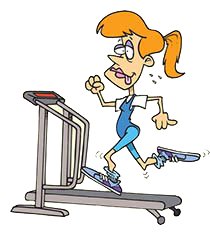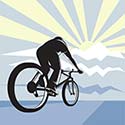Your Top 10
Beginner Running Tips

The beginner running tips page is a quick reference point to make sure you have got all the basics covered – if you are a novice runner or never ran before this list is a great place to start your research ;-)
You have already taken that “first step” by deciding to give running a go, but the next steps are all important and might be harder than you think - especially if you are running for the first time. Running for beginners can be tough, I won’t mince my words – BUT the rewards are quick and worth your while…
Keep the “motivational juices” flowing and remember, every time you run that quarter mile further or a few minutes more, it is your own personal record and another step towards your goal…
Could be your first 5K, 1 mile or even a 10K – it’s up to you!
So… ready to get started?
Here goes…
Running Shoes
There are stability running shoes, performance shoes, neutral and minimalist shoes – so, which do you choose? Well, I can give you an idea of what is best suited for beginners but there is no “one size fits all” and a bit of trial and error might be needed to find out what works for you
Personally, I would start off in a minimalist running shoe with little or no padding. The fact that your foot can feel the ground and not protected by padding, promotes a better running technique and body response
Padded running shoes have their place and some runners swear by them, but for me the more padding you have under your foot, the more unnatural your running style is likely to be
The Walk/Run Method
The ideal way to start running is to follow our Couch to 5K training program which uses the walk/run method– this prepares you for running by combining periods of walking with gradually increased periods of running. In your first session you run for 1 minute, walk for 2 minutes and repeat eight times - over an 8 week period you would improve stamina by increasing the periods of running until you can run for 30 minutes non-stop (about 3 miles) – click here to find out how
Warm Ups And Warm Downs
A great beginner running tip is to warm up with a 5 minute walk. This prepares your muscles for a run and you are less likely to pull something when muscles are warm. Once you finish a run warm down with another 5 minute walk, don’t just stop. This helps your muscles to recover properly, reducing soreness afterwards
Cross Training

Run 3 or 4 times a week, and on non-running days do some cross training. Cycling, swimming and strength training are good options - they work other muscle groups to give your body more balance
Other beginner running tips for cross training are walking, tennis, squash, football (soccer) and even cross-country skiing!
Run On Hard And Soft Surfaces
Explore your local area for good places to run, try to find different surfaces – research shows that running on a variety of surfaces (bumpy, smooth, hard and soft) engages more muscles in your legs and if done gradually, makes your legs stronger, improving your chances of avoiding injury
Click here for more tips on Where to Run
How Fast To Run
Run at an easy pace - a pace which you could maintain for a long period. One of our beginner running tips for this is to do the ‘talk test’ - if you can talk in complete sentences as you run without losing your breath, you are running at easy pace – If you normally run alone, talk to yourself, I do :-)

Breathing
Breathing deeply through the mouth seems to be the most efficient way to get oxygen to the body and that is your ultimate goal. You need to be comfortable so find the way that feels right for you ;-)
Note: As a beginner it is normal to feel breathless during a run, this is usually nothing to worry about and should pass as you become fitter. If you feel too breathless slow your pace or have a walk-break
Follow A Running Program
I enjoy my running more by following a running program. It defines my running and keeps me focused on a target. I pin mine to the office wall so that I can see my progress unfolding and I always know what I have to do each day. Often when runners get injured, it is because they have tried to run too far, too soon - following a running program will help you to avoid this scenario
Check out our Couch to 5K or Couch to 10K running programs – perfect for the beginner
Nutrition For Runners
You don’t need to worry about running-specific foods until you are fuelling much longer runs. Focus on a “normal healthy diet” for now, you still expend a lot of energy as a beginner and your body needs a reliable supply of energy. Another important beginner running tip is to stay hydrated throughout the day and take water on your runs ;-)
Running Motivation
To stay motivated always have a target. Your first target might be to run a 5K but what then? The mistake beginners often make is to reach their first target and not have another one already planned – without a target you soon become bored, train less and eventually stop running, so move from one target to the next and make gradual improvements
That’s it! Now you have all the beginner running tips you need!
If you want to print this list and keep somewhere handy, download the printer-friendly version below:
... And don't forget to check out the links below for even more beginner running tips -
Good Luck! :-)
Can you already run 2 miles without gasping like a fish out of water? Great! You’re ready for our beginner 10k training plan. No more procrastinating—those miles won’t run themselves... (we checked)! 🏃♂️💨
Is your couch starting to think you’re its permanent accessory? Time to prove it wrong! Our Couch to 5K walk/run program will get you from binge-watching Netflix to the finish-line in just just 8 weeks—no running experience needed. Your couch will miss you... but you won’t miss the finish line! 🏃♂️💨 For more 5K tips, click here
Want to know the truth about the health benefits of running? Here we will look at the ones which have been researched, and then decide which to believe
To return from the Beginner Running Tips page back to the home page click here

